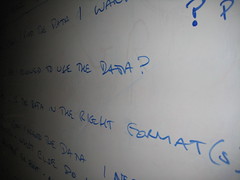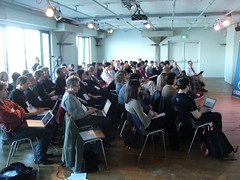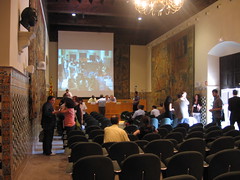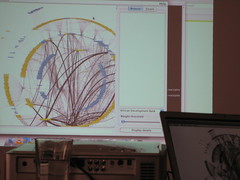Don't miss a thing! Stay on top of what's happening in the #OpenMovement around the world.
Greek Translation of the Open Knowledge Definition (OKD)
We’ve just added a Greek translation of the Open Knowledge Definition! Many thanks to Ioannis Doukas of King’s College London and the University of Athens! If you’d like to translate the Definition into another language, or if you’ve already done so, please get in touch on our discuss list, or at info (at) the OKF’s […]
Read moreAfter the Workshop on Open Scientific Resources
The Workshop on Finding and Re-using Open Scientific Resources (cf. last week’s announce) took place on Saturday at the London Knowledge Lab. The day started with a discussion of various aspects of openness in educational and research materials – alluding to open access, open data and the Open Knowledge Definition. This was followed by brainstorming […]
Read moreWorkshop on Finding and Re-using Open Scientific Resources, Saturday 8th November
As we announced earlier this month, tomorrow is our Workshop on Finding and Re-using Open Scientific Resources. As a concrete outcome of the workshop, we hope to add more open scientific resources to CKAN, as we did last Saturday in the Workshop on Public Information and which we’ve blogged about in the past. So far, […]
Read moreAfter the Workshop on Public Information
On Saturday was the Workshop on Finding and Re-using Public Information (which we blogged about last week). We had very positive feedback from participants, and we’ll certainly consider doing something similar again in the future. There was representation from across the board – from local government to European policy analysts, from civic society to commercial […]
Read moreGFDL v.1.3 + CC-BY-SA
Fantastic news from the Free Software Foundation which has just announced that the latest draft (v.1.3) of the GNU Free Documentation will strive to address problems with license interoperability by allowing users to switch to a CC-BY-SA license: This version of the license allows public wikis to relicense their FDL-covered materials under the Creative Commons […]
Read moreCKAN 0.7 Released
Just in time for our upcoming workshops a new version of CKAN (v0.7) is ready. It provides some major improvements including: Convert to use SQLAlchemy and vdm v0.3 (v. major) Atom/RSS feed for Recent Changes Package search via name and title Tag lists show number of associated packages The CKAN code is available from: http://pypi.python.org/pypi/ckan/0.7 […]
Read moreOpen Everything London: Speakers Confirmed
We’re pleased to announce that the main speakers for Open Everything London (on next Thursday 6th November) have now been confirmed: Glyn Moody “… a technology writer. He is best known for his book Rebel Code: Linux and the Open Source Revolution (2001). It describes the evolution and significance of the free software and open […]
Read moreShakespeare v0.6 Released
See http://pypi.python.org/pypi/shakespeare/0.6 which includes full installation instructions. We’ve also reorganized the sites so that the news/blog is here at http://blog.openshakespeare.org/ and the Shakespeare package web interface is at http://www.openshakespeare.org. Main changes include: Major refactoring of internal code to be cleaner and simpler A new cleaner and reorganized web interface Search support via Xapian: http://www.openshakespeare.org/search/ Statistical […]
Read moreWorkshop on Finding and Re-using Public Information, Saturday 1st November
As we blogged a few weeks back we’re putting on a workshop on ‘Finding and Re-using Public Information’, co-organised with the Office of Public Sector Information (OPSI), the Power of Information (POI) Taskforce and mySociety. Its coming up this Saturday! Details are as follows: When: Saturday 1st November 2008, 1030-1600 Where: London Knowledge Lab, 23-29 […]
Read moreSecond open textbook virtual meeting, 27th October
A reminder that a second open textbook virtual meeting will take place tomorrow: When: Monday 27th October 2008, 1800 GMT, 1300 EST or 1100 PST Where: #okfn channel at oftc.net Wiki: http://okfn.org/wiki/opentextbooks If you would like to participate you can connect using a web-based service such as Mibbit (click here to join the channel via […]
Read moreThird COMMUNIA Workshop – Marking the public domain
The third COMMUNIA workshop ‘Marking the public domain: relinquishment & certification’ (which we mentioned last week) took place in Amsterdam on Monday and Tuesday. It brought together COMMUNIA members and other relevant parties from across Europe for talks and workshops focusing on legal issues related to the public domain, and how public domain works can […]
Read morePublic Domain Calculators: updates and a new list!
Back in June we solicited for assistance in a project to build a series of calculators to ‘map’ the public domain in different jurisdictions, by showing which works are out of copyright. There are now individuals and groups keen to contribute to the calculators in at least 10 countries: Argentina: Bienes Comunes Canada: Access Copyright […]
Read moreOpen Access Day 2008
As many of you will have gathered, 14th October 2008 was Open Access Day. Peter Suber (of Open Access News and on the OKF’s Advisory Board) and Gavin Baker have provided an 8 page roundup of some of the comments on OA from around the world (1 2 3 4 5 6 7 8). You […]
Read moreOpen Everything London, 6th November 2008
As you may know, we’ve been involved in co-organising Open Everything London with the Young Foundation, the Shuttleworth Foundation and Open Business. We’re pleased to say that details are now confirmed… When: Thursday 6th November, 0900-1730 and then drinks afterwards… Where: The Roundhouse, Chalk Farm Road, London NW1 8EH (map) Wiki: http://openeverything.wik.is/London Cost: £15 donation […]
Read moreWorkshop on Finding and Re-using Open Scientific Resources, 8th November 2008
We’re pleased to announce another OKF workshop in London this November – on ‘Finding and Re-using Open Scientific Resources’. As a concrete outcome of the workshop, we hope to add more open scientific resources to CKAN, which is something we’ve blogged about in the past. Details of the workshop are as follows: When: Saturday 8th […]
Read moreWorkshop on Finding and Re-using Public Information, 1st November 2008
We are pleased to announce a workshop on ‘Finding and Re-using Public Information’, co-organised with the Office of Public Sector Information (OPSI), the Power of Information (POI) Taskforce and mySociety. Details are as follows: When: Saturday 1st November 2008, 1030-1600 Where: London Knowledge Lab, 23-29 Emerald Street, London, WC1N 3QS. (See map.) Wiki: http://okfn.org/wiki/PublicInformation Participation: […]
Read moreOpen organisations, need for two more definitions!
If starting a new, public interest, organisation, there are three obvious principles you might like to have. Finance – have all bank transactions automatically public in real time. Plus accounts. Software – all software made by the organisation to be open source. Information – voluntarily subscribe to some sort of FOI law. The software one […]
Read moreVote for ‘Where Does My Money Go?’ at the Show Us A Better Way poll!
The Guardian’s Free Our Data campaign has set up a poll to help gather people’s opinions on the best entrants for the Show Us A Better Way competition run by the Power of Information Task Force. They also wrote about this in the Guardian a few days back. As we recently posted about, we entered […]
Read moreAfter the open textbook virtual meeting
On Monday we hosted a virtual meeting on open textbooks. A transcript of the meeting is up on the wiki page. There is also a brief writeup on Wikibooks News. Several things to come out of the meeting: There was general agreement that it would great if people interested in and working with open textbooks […]
Read moreOpen textbook virtual meeting today!
A final reminder for our open textbook meeting later today. Details from the wiki page: This will be an online meeting for anyone interested in open textbooks – including students, educators, authors, activists, funders, policy makers, distributors and publishers. The event will be an opportunity for people who work in this area to present projects, […]
Read moreWhat can you do with Open Shakespeare?
We’ve recently updated Open Shakespeare. The project was started a while back as an open knowledge ‘exemplar project’ – i.e. as a simple ‘hello world’ type open knowledge package (for more on this see the FAQ). It aims to: Provide the complete works of Shakespeare, along with textual apparatus (introduction, notes) and tools (concordance, search […]
Read moreWhere Does My Money Go?
Since early 2007 we’ve had a project dubbed ‘Where Does My Money Go?’ on the backburner. In a sentence, the project would be a web application that interactively represented UK government budgetary information using maps, timelines, and best of breed visualisation technologies. We recently submitted the project to the Show Us A Better Way and […]
Read moreClearer Climate Code
GISTEMP is a crucial open data set, because it contains the historical global temperature record. Not very important right now, but in the medium term absolutely vital for the continuing functioning of our society given the likelihood of adverse climate change. Stations that measure temperature naturally do so at specific points in space, and the […]
Read moreSome Agricultural History via Open Economics
One of the active Open Knowledge Foundation projects is Open Economics. A substantial part of that effort ends up being data acquisition and ‘cleaning’: getting hold of economic data, parsing it into (computer) usable form and adding it to the Store. (Wouldn’t it be nice if that data was already nicely packaged up or at […]
Read moreDatabase Back Up
Unfortunately due to upgrades of the software on the server the Public Domain Works DB has been down recently. Now, thanks to recent coding efforts it is back up with some early (1900s) data from musicbrainz. Check it out at: http://db.publicdomainworks.net/
Read moreOpen Data in Iceland
Hjalmar Gislason recently wrote to us to tell us about an initiative to open up material from the Icelandic government and other public institutions. In The Case for Open Access to Public Sector Data he writes: In these public data collections lies tremendous value. The data that has been collected for taxpayers’ money for decades […]
Read moreOpen textbook virtual meeting, 29th September 2008
In addition to our Open Text Book project, we’re very interested in the creation, distribution, use and re-use of open textbooks. We’ve arranged a virtual meeting later this month for anyone interested. Details are as follows: When: Monday 29th September, 1000 PST, 1800 BST or 1900 CEST Where: #okfn IRC channel at oftc.net. To join […]
Read moreNew Open Science Mailing List
After discussions with Cameron Neylon of Open Wetware and Kaitlin Thaney of Science Commons we’ve set up an open science mailing list: http://lists.okfn.org/cgi-bin/mailman/listinfo/open-science As far as we could tell, there wasn’t a general mailing list for people interested open science. Hence the new list aims cover this gap, and to strengthen and consolidate the open […]
Read moreA Map of Openness?
We’ve recently been in conversation with various individuals about starting a project to map open projects and groups. People who have been particularly keen include: Panagiota Alevizou, London School of Economics Michel Bauwens, P2P Foundation Juan Carlos De Martin, COMMUNIA Heather Ford, iCommons David J Patrick, Linuxcaffe Mark Surman, Shuttleworth Foundation and soon of the […]
Read moreA Wikipedia of English law
Writing in Times Online in April 2006 the eminent Professor Richard Susskind, legal tech guru and adviser to the great and good, spelt out his vision for a “Wikipedia of English law”: This online resource could be established and maintained collectively by the legal profession; by practitioners, judges, academics and voluntary workers. If leaders in […]
Read moreInterview with Science Commons for their Voices from the Future of Science
Science Commons in the person of Donna Wentworth have done an interview with me as part of their series on “Voices from the Future of Science”. Among other things, I talked about what we can learn from the open source movement (Debian of Data anyone), current status and future plans for CKAN, and why we […]
Read moreOKF on Identi.ca and LinkedIn!
The Open Knowledge Foundation now has an account on Identi.ca (an open service which we posted about last month): http://identi.ca/okfn There is also a group on (the pretty non-open) LinkedIn! http://www.linkedin.com/groups?gid=159750
Read moreMike Linksvayer of Creative Commons joins Open Definition Advisory Council
We are pleased to welcome Mike Linksvayer, Vice President of Creative Commons, onto the Advisory Council for opendefinition.org. The Advisory Council, as we announced in February is the body formally responsible for maintaining and developing the Definitions and associated material found on the opendefinition.org site – including the Open Knowledge Definition and the Open Software […]
Read moreCKAN and Finding Open Data in the Life Sciences
Melanie Dulong de Rosnay recently published an excellent paper on open data in the life sciences in Nature Precedings entitled Check Your Data Freedom: A Taxonomy to Assess Life Science Database Openness. From the abstract: Molecular biology data are subject to terms of use that vary widely between databases and curating institutions. This research presents […]
Read moreMoving forward with Open Science in Europe
Last week I went to the Institut d’Estudis Catalans in Barcelona for the Euroscience Open Forum Satellite Event organised by Science Commons. The event brought together together lawyers, scientists, policy makers, stakeholders and representatives from many different groups and organisations interested in open access and open data in scientific research from across Europe. The event […]
Read moreOpen Software Service Definition Launched
For more than a year we’ve been working with a variety of groups and individuals to fashion a clear definition of ‘openness’ in relation to online, software-based, ‘services’ (think: search engines, webmail, online spreadsheets, etc). The result, launched today, is the Open Software Service Definition: http://www.opendefinition.org/ossd/ Simultaneously released, and to which we are party, the […]
Read moreCKAN 0.6 Released
Version v0.6 of the Comprehensive Knowledge Archive Network (CKAN) software has just been released (and simultaneously rolled out to the site). Changes include: Autocompletion (+ suggestion) of tags when adding tags to a package. Paginated lists for packages, tags, and revisions. RESTful machine API for package access, update, listing and creation. API Keys for users […]
Read moreIdenti.ca and ur1.ca – two new open services!
Over the past few days Evan Prodromou of Wikitravel and Vinismo launched two new open services: ur1.ca and Identi.ca. Evan got in touch to make sure that both services were compliant with the draft Open Service Definition and we’re pleased to say that they are both fully open services! Ur1.ca is a neat little service […]
Read moreOpen Tech 2008
We’ll be presenting at Open Tech 2008 which takes place next Saturday (5th July). Specifically there’ll be a talk (by Rufus Pollock) on “Opening Data”, and I’ll be speaking about CKAN. This is a great event with lots of open knowledge stuff going on so do come along. Details are as follows: When: Saturday 5th […]
Read moreOver 200 Packages on CKAN!
Today the number of packages in the Comprehensive Knowledge Archive Network (CKAN) has passed the 200 mark! CKAN is an open registry of (open) knowledge packages – from genes to geodata, sonnets to statistics. CKAN currently includes basic metadata about each package – including title, URL, download URL, tags, license information and notes. Packages include […]
Read moreSecond Open Visualisation Workshop, Saturday 21st June 2008, Trampoline Systems
At the first Open Visualisation Workshop last month, we found there was significant demand for regular workshops. Hence, the second Open Visualisation Workshop will take place a week from Saturday! Details are as follows: When: Saturday 21st June 2008, 11am – 5pm Where: Trampoline Systems, 8-15 Dereham Place, London, EC2A 3HJ (view on OpenStreetMap) Wiki: […]
Read moreMapping the Public Domain – Call for Assistance!
For a while we’ve been planning to help to produce a set of Public Domain Calculators – which each aim to indicate whether or not a given work is in the public domain in a given jurisdiction. The idea arose in relation to our Public Domain Works project (a registry of works in the public […]
Read moreItalian Translation of the Open Knowledge Definition (OKD)
We’ve just added an Italian translation of the annotated Open Knowledge Definition – thanks to Primavera De Filippi, Andrea Glorioso and Juan Carlos De Martin at the NEXA Center for Internet & Society, Politecnico di Torino! If you’d like to translate the Definition into another language, or if you’ve already done so, please get in […]
Read moreMore Text Up from Shakespeare’s Entry in Encyclopaedia Britannica 11th Edition
Another 3 pages (4600 words) are up from the EB 11 Entry on Shakespeare covering most of Shakespeare’s plays in chronological order. Current material can be found on: Encyclopaedia Britannica 11th Edition page Source version (plain text in subversion) can be found at: http://knowledgeforge.net/shakespeare/svn/trunk/shksprdata/ancillary/britannica-11th.txt
Read moreVersioned Domain Model v0.2 with Support for SQLAlchemy Released
v0.2 of versioned domain model is now finally done — it was 95% complete in Feb but it has taken another 3 months to iron out the last bugs and polish up! Apart from being a concrete implementation of a system for versioning data(bases) — and therefore important for efforts to do more collaborative development […]
Read moreAfter the first Open Visualisation Workshop
The first Open Visualisation Workshop took place on Saturday as we mentioned last week. Details, notes and links are available on the event’s wiki page. The event took place at Trampoline Systems’ new site in East London. To make sure the event was as informal as it was billed to be – we left the […]
Read moreOpen Visualisation Workshop, Saturday 24th May 2008, Trampoline Systems
As we mentioned last month we’ve been organising an informal, hands-on workshop focusing on open source visualisation technologies. This will take place on this coming Saturday in London. Details are as follows: When: Saturday 24th May 2008 from 11 am until whenever people need to leave (probably 4 or 5 pm); Where: Trampoline Systems, 8-15 […]
Read moreDispatches from Digistan
Chris Puttick of OpenArchaeology sends news of the Digital Standards Organisation: A new group is being formed to promote open digital standards, starting with a declaration regarding the importance of digital standards being truly open. Part of Digistan’s effort to promote understanding, development, and adoption of open digital standards implies a clear definition of what […]
Read moreBeyond Strong and Weak: Towards a Typology of Open Access
Over the past week or so there has been a flurry of posts about ‘strong’ and ‘weak’ open access, including the following: Strong and weak OA, Peter Suber What’s in a Name? Strong and Weak Open Access, Glyn Moody The Two Forms of OA Have Been Defined: They Now Need Value-Neutral Names, Stevan Harnad Lower […]
Read moreFirst Open Knowledge London Meetup on Wednesday 30th April
The first Open Knowledge London meetup will take place this Wednesday at the London Knowledge Lab. The meetup should be great opportunity for informal discussion of open knowledge projects and issues. If you’d like to participate or present, please add details to the wiki page! When: Wednesday 30th April, 19:00-21:00 Where: London Knowledge Lab, 23-29 […]
Read more













